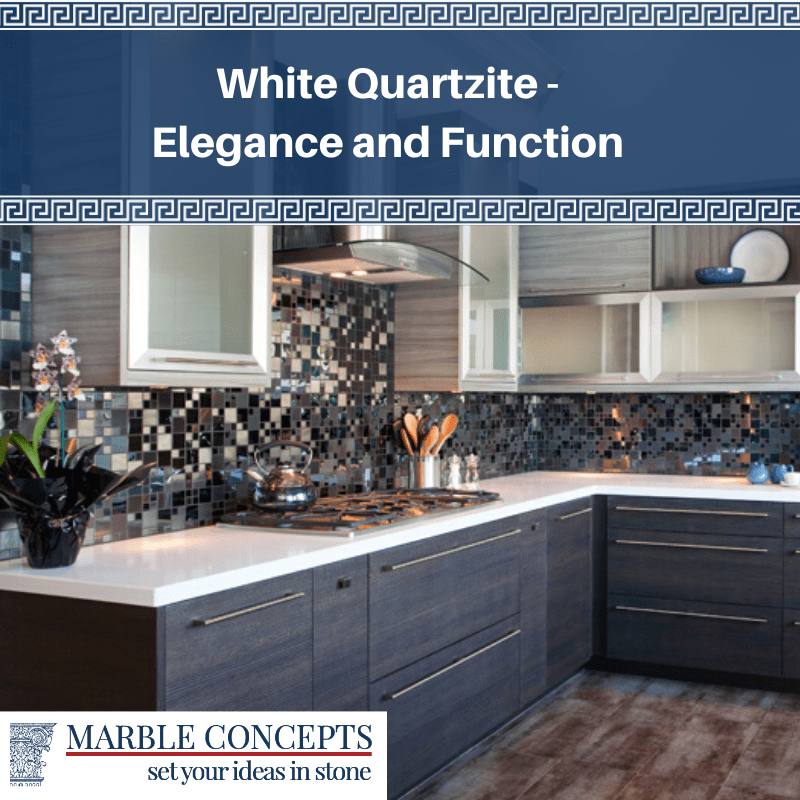When you think of white quartzite what immediately comes to mind is the genuine nature of the stone and how well it functions as a countertop material. So what is the composition of white quartzite and what are its attributes that make it an elegant and functional choice for kitchen countertops?
White Quartzite Composition
White quartzite is a hard stone that is classified as a metamorphic non-foliated rock. That means it’s a rock composed mostly of quartz. Its primary component is sandstone that has gone through changes by heat, pressure and other natural processes. As a non-foliated rock, quartzite further takes its form through intrusions or injections of igneous rock that result from volcanic processes where high temperatures are in the works with low pressure acting throughout the process. Sand grains and silica recrystallize and are bound together, which results in a structure of interlocking grains of quartz that are incredibly strong.
Quartzite Attributes
Pure quartzite is a natural stone that is usually white or gray in color. It contains small to large veins than can range from light to dark shades. Quartzite can be solid in coloring or have a crystal-like appearance. White quartzite can exhibit sparkle and flecks and, again, beautiful and intriguing veining. Shades of white may extend from absolute white into beige and gray. Super White Quartzite compares to the whiteness of marble and is often confused with white marble slabs. Any impurities in quartzite can bring out the elegance of the stone through unique patterns and swirls. Quartzite can also appear in shades of pink and red because of the amount of iron oxide that the stone may contain. Other mineral content in quartzite can produce blue, brown, green, orange and yellow colors in the stone.
Another attribute of quartzite is its hardness. The Mohs system of measurement gives quartzite a hardness score anywhere between 7 to 10, which means that it’s much harder than glass and will cut glass. Quartzite is also harder than granite and marble.
White Quartzite Countertops
With all the options for countertops today, natural white quartzite is a good choice as it’s not only functional but elegant. Strength, durability and beauty personify white quartzite. If you like the look of marble and prefer countertops that are light in color, you’ll like quartzite, and you’ll also like that it’s resistant to temperature extremes, etching and chemicals, particularly when countertops undergo sealing. Sealing will create super resistance that stops liquid and food stains from coffee, wine, citrus and other acid based substances. Sealing will also protect against surface scratches.
Super White Quartzite
Whether you speak of white quartzite or super white quartzite, you’re still dealing with quartzite. You’re looking at a durable and long lasting natural stone material that’s elegant like marble but is considerably more durable than marble. Tried and true quartzite is high functioning, particularly if it’s of the hard variety as opposed to a softer quartzite. It will be naturally resistant to water absorption, scratches, heat, stains, etching, acidic foods and chemicals. When looking for these features in quartzite, you’ll want a pure stone that is one hundred percent quartzite. Though considered indestructible, white quartzite still requires sealing to protect it completely and maintain its beauty.
Regular Sealing, Maintenance and Cleaning
Super White or white quartzite is not necessarily indestructible. Like any other countertop material, it requires a maintenance plan. Regular sealing is part of that and is imperative in protecting white quartzite against etching and staining. When purchasing it, you’ll want the installer to seal your countertops at the outset. After that, you’ll want to seal them at least once a year with products specifically designed for quartzite. Professional services for sealing are available but can be expensive.
Cleaning white quartzite is fairly routine. You’ll want to use mild soap and water or a low pH cleaner that is non-acidic. More natural stone specific cleaners can usually be found through natural stone dealers, home improvement stores, hardware stores or online retailers.
For cleaning, wipe a soap and water solution or an appropriate cleaning product on the countertops with a sponge or soft white cloth. You don’t want to use any type of abrasive cloth or sponge. If you’re using plain soap and water, a few drops of detergent added to a quart of water should clean any dirt or debris from the countertops. Any etching or deeper staining will require actions other than cleaning. There are specific products for both or professional stone restoration services if needed.
The main thing to remember is to wipe off spills as soon as they happen. Also, use trivets, hot pads, potholders and other heat saving accessories to protect countertops against hot ovenware and pans.
Finishes
Another protective measure against etching and other possible damage to quartzite countertops is choosing a honed finish over a polished one. Though a honed finish eliminates a glossy or reflective finish to quartzite countertops, it’s a much simpler and protective finishing process. With a hard stone like quartzite, polishing will be difficult and honing will help deter etching. A honed stone will be both flat and smooth as opposed to one that has been polished.
When you choose quartzite for your countertops, it’s important to know as much as you can about this elegant and durable natural stone. If you have general questions about white quartzite or are interested in using it for kitchen countertops, complete the online contact form and a representative will be happy to answer any of your questions concerning white quartzite and its function in your home.






